Remember when weekends meant gathering around the television with a bowl of sugary cereal, fighting over the remote control, and waiting for your favorite shows to come on? The ’80s living room was a symphony of sounds that defined a generation—from the static hiss of VHS tapes being rewound to the unmistakable jingles of Saturday morning commercials. Take a trip down memory lane with these familiar sounds that filled our homes before smartphones and social media changed everything forever.
1. “Be kind, rewind!”
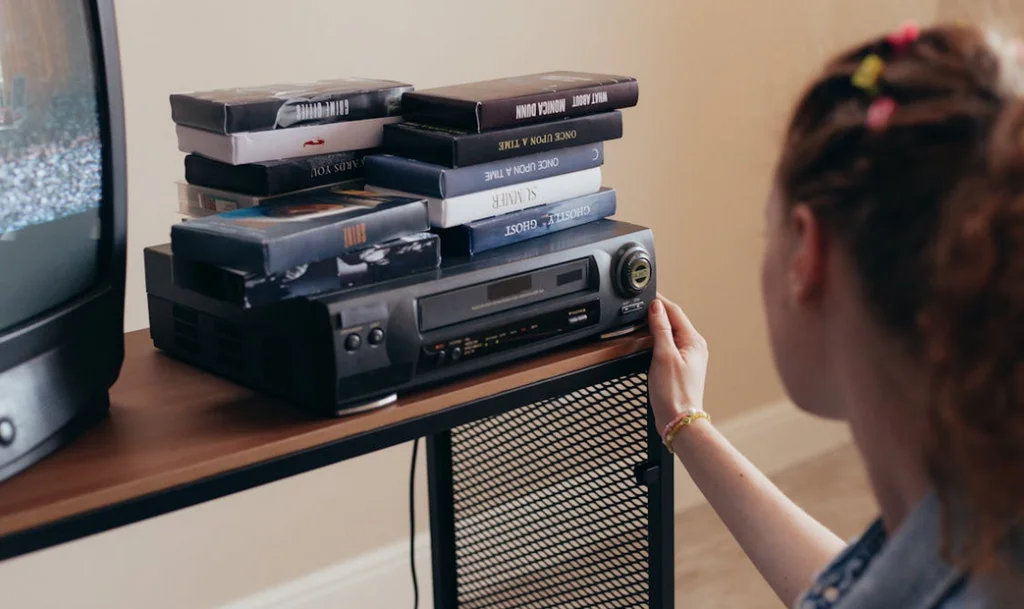
The whirring mechanical sound of a VHS tape rewinding was the soundtrack to movie night preparations across America. You’d wait impatiently, listening to that distinctive high-pitched whine, knowing that if you returned the tape to Blockbuster without rewinding it first, you’d face both a fee and the judgment of the video store clerk. Sometimes you’d even splurge on a separate rewinding machine shaped like a race car or DeLorean, just to save wear and tear on your precious VCR. Over on Forbes, there’s an argument to be made that the kindness this motto promoted can be applied to all areas of life to promote career success.
Parents would call out this familiar phrase as a reminder of video rental etiquette, usually while putting away the empty pizza boxes and soda cans from family movie night. The concept seems quaint now, but back then, it was considered the height of rudeness to make the next renter wait through a full rewind. Remember how satisfying it was when the machine would automatically stop and eject the cassette with that solid mechanical “thunk”?
2. “Don’t touch that dial!”
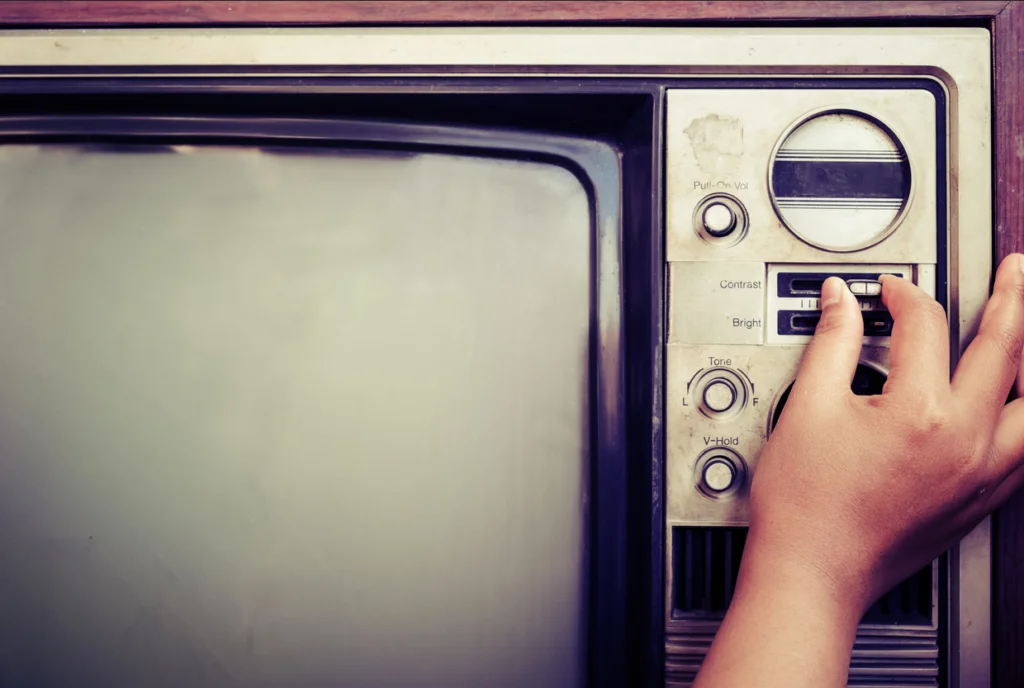
Television networks would frantically remind viewers not to change the channel during commercial breaks, promising that their favorite program would “return after these messages.” Kids would hear this line dozens of times on Saturday mornings, creating a Pavlovian response that kept them glued to their favorite cartoons. The phrase was so overused that parents often mimicked it sarcastically when trying to wrangle the remote control away for their own programs. EE Times recalls a time when managing the TV dials meant knowing the equivalent of flight controls, so many were there to learn.
With only a handful of channels to choose from, the battle for the family TV was serious business, requiring diplomatic negotiations worthy of the United Nations. You’d hear siblings making elaborate deals—”I’ll let you watch ‘The A-Team’ if I get to see ‘Knight Rider’ next week”—while parents served as reluctant mediators. The concept of everyone watching their own shows on separate devices would have seemed like science fiction, making the phrase “don’t touch that dial” both a command and a plea for peace in the household.
3. “We are the world, we are the children…”
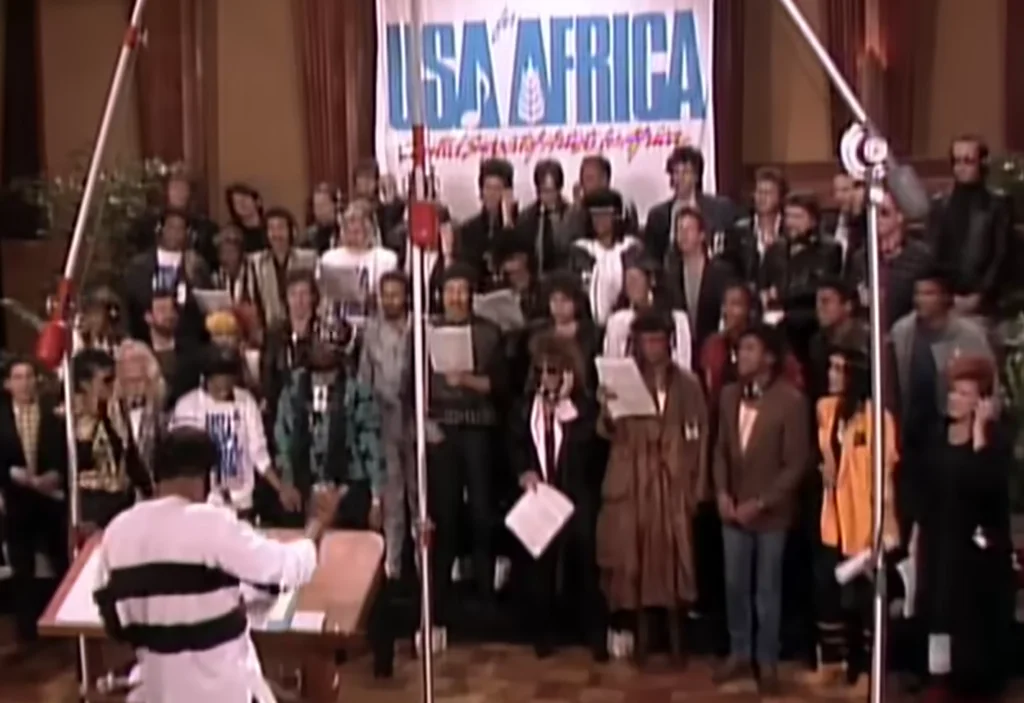
The unmistakable opening lines of charity singles would float through living rooms as families gathered to watch Live Aid or other benefit concerts on TV. These massive musical collaborations brought A-list celebrities together for causes that parents would try to explain to confused children between performances. The living room would fall silent as everyone listened to these earnest anthems, briefly uniting the family in a rare moment of shared cultural solemnity. Time Magazine serenades the history of this powerful movement and song that rocked the world.
Someone would inevitably start singing along, usually slightly off-key, triggering an impromptu family sing-along that wavered between heartfelt and embarrassing. Dad would surprise everyone with his unexpected knowledge of every word, while Mom might wipe away a tear, touched by both the message and the fleeting moment of family harmony. These songs became ambient background music in households across America, their choruses embedded in our collective memory even decades later.
4. “I’ve fallen and I can’t get up!”

This catchphrase from the Life Alert commercial echoed through living rooms so frequently that it quickly transcended its serious purpose to become a cultural punchline. Family members would dramatically re-enact the commercial during everyday minor stumbles, turning a product aimed at elderly safety into an inside joke for the entire household. Children would collapse on the carpet after tripping over toys, delivering the line with theatrical flair while parents rolled their eyes at the hundredth repetition. National Institutes of Health reviews the different forms medical alert bracelets can take and their importance.
What started as a legitimate product advertisement became so deeply embedded in ’80s vernacular that you couldn’t help but hear it whenever someone took a tumble. The commercials themselves seemed to air exclusively during family viewing hours, prompting uncomfortable conversations with grandparents about aging and independence. Little did we know this simple phrase would outlive most other advertising slogans, still recognizable to generations who weren’t even born when it first aired.
5. “Where’s the beef?”
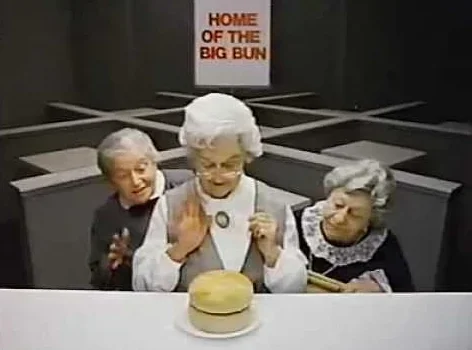
Wendy’s iconic commercial catchphrase escaped the boundaries of advertising to become everyday slang for questioning substance or value. Grandparents would genuinely chuckle at the cranky old lady demanding more meat in her burger, while kids parroted the line without fully understanding its appeal to adults. You’d hear the phrase applied to everything from homework assignments to political debates, proving how thoroughly commercials had infiltrated our home conversations.
Dad would inevitably trot out this catchphrase at dinner time, particularly when serving hamburgers, considering himself hilarious every single time. The family would groan collectively, yet somehow the phrase never lost its place in the household lexicon, becoming comfort food for the ears. Advertising executives couldn’t have dreamed how successfully their three-word slogan would embed itself into living room banter across America, turning customers into unpaid promoters at dinner tables everywhere.
6. “Mom, the tracking is messed up again!”

The frustrated cry of children trying to watch a degraded VHS tape would prompt sighs from parents forced to become amateur technicians. You’d watch as horizontal lines sliced across the screen, distorting your favorite movie until someone adjusted the tracking knob with surgical precision. This technical interruption became so common that families developed designated “tracking experts” who claimed special talents for fixing the picture quality.
The fuzzy screen would trigger a household debate about who had damaged the tape through repeated viewings or improper storage. Parents would deliver lectures about handling tapes carefully while delicately turning the tracking dial, performing a forgotten art that required patience and a steady hand. When the picture finally stabilized, there would be a moment of collective triumph, as if the family had overcome a significant technical challenge together.
7. “This is your brain on drugs. Any questions?”

The serious voice-over from anti-drug PSAs would silence the room as parents awkwardly gauged their children’s reactions to the frying egg metaphor. These public service announcements had an uncanny ability to air just when the family was comfortably enjoying a show together, creating instant tension. The brief quiet following these commercials spoke volumes, with parents hoping the message was sinking in while kids mainly wondered when their program would resume.
“Just say no” and other drug prevention slogans became part of the living room vocabulary, awkwardly inserted into family discussions. Parents would reference these commercials during attempted serious talks, hoping the familiar imagery would reinforce their warnings about the dangers awaiting outside the safety of home. The effectiveness of these campaigns remains debatable, but their phrases became permanent residents in ’80s household communication.
8. “Thundercats, ho!”
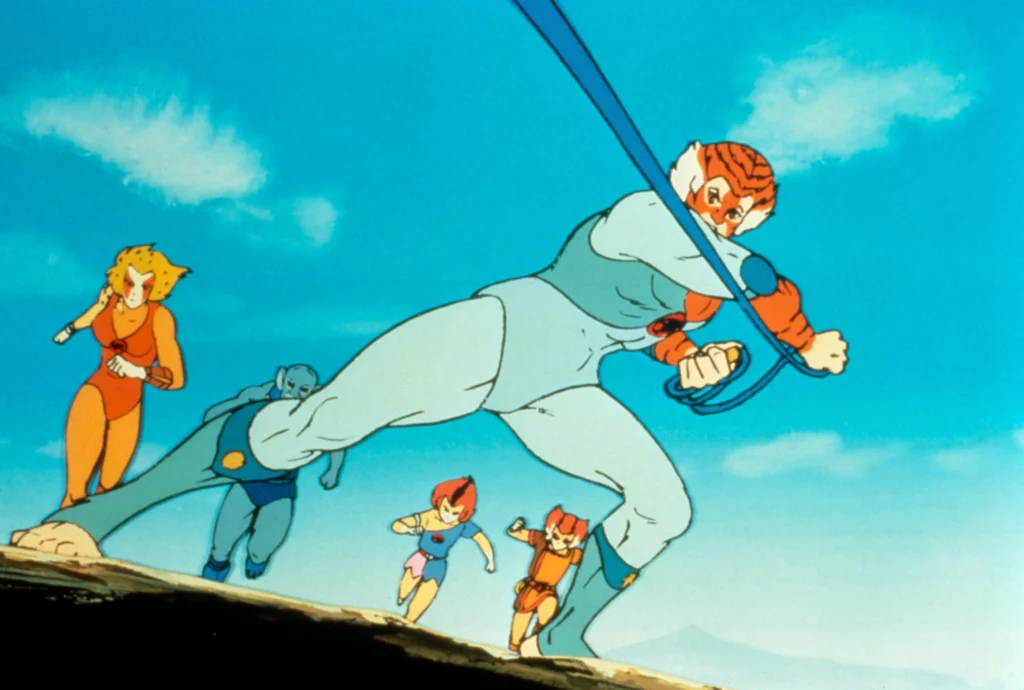
Battle cries from animated heroes announced the start of Saturday morning cartoon blocks, drawing children to the television like moths to a flame. Siblings would race for the best spots on the couch, arranging themselves and their cereal bowls for optimum viewing of He-Man, She-Ra, or the Thundercats. These catchphrases would be repeated throughout the weekend as kids reenacted their favorite scenes, transforming living room furniture into castles and spaceships.
Parents would hear these battle cries with mixed emotions—relief for the temporary peace of occupied children, but dread for the inevitable toy requests that would follow. The living room floor would become a minefield of action figures and plastic weapons inspired by these shows, creating a hazardous landscape for bare feet. These cartoon catchphrases eventually became shorthand for the entire Saturday morning experience, encapsulating a weekly ritual that defined childhood weekends.
9. “You’ll shoot your eye out!”
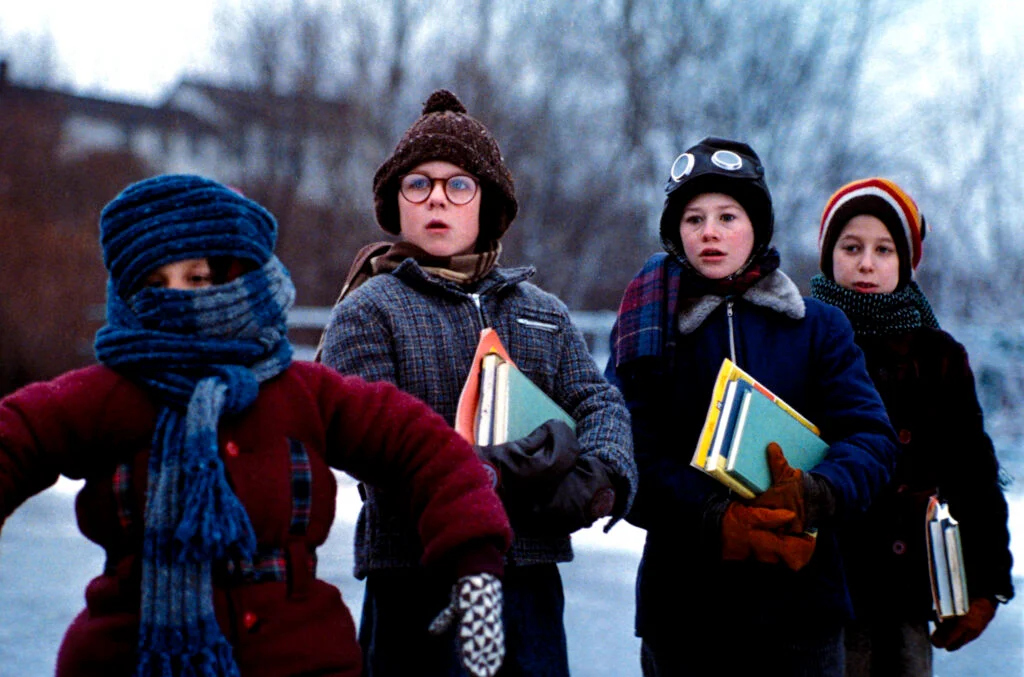
Every holiday season, the cautionary line from “A Christmas Story” would echo through living rooms as families watched their annual favorites on broadcast TV. The phrase quickly transcended the movie itself, becoming parental shorthand for denying any remotely dangerous request from children. Dad would deliver the line with exaggerated accent and timing, considering himself the family comedian while kids rolled their eyes at the predictable reference.
The limited selection of holiday specials meant families watched the same movies year after year, memorizing dialogue they’d repeat at perfectly timed moments. These shared viewing experiences created a strange familiarity, as if the characters on screen were distant relatives who visited once annually. Living room furniture would be rearranged to accommodate everyone for these special broadcasts, creating a temporary theater where the family gathered for their yearly ritual of quotable holiday classics.
10. “I want my MTV!”
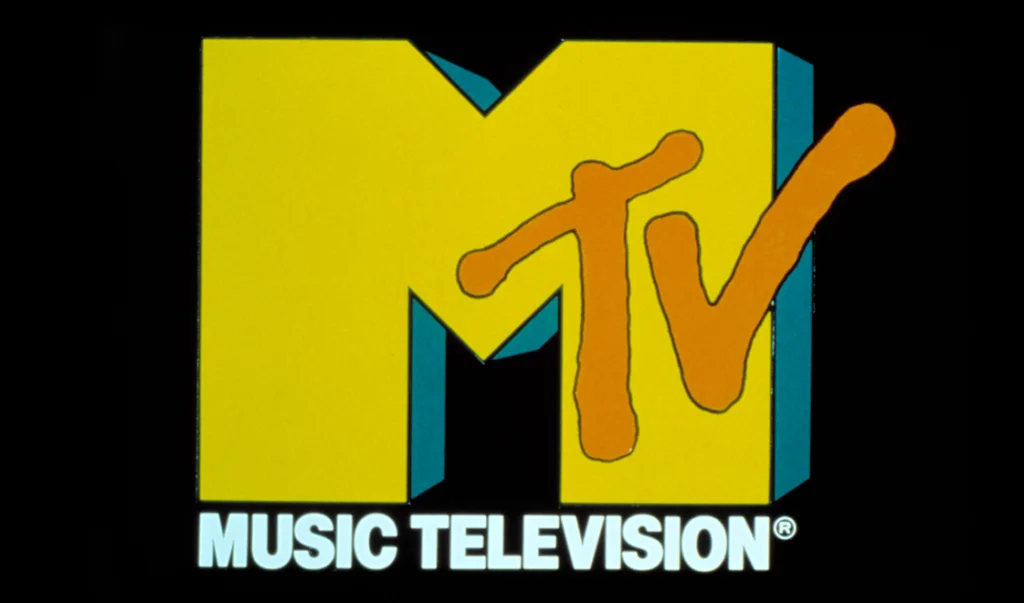
The demanding slogan from rock stars encouraging cable subscribers to request the music channel became a regular living room refrain. Teenagers would dramatically deliver this line to parents, who were often bewildered by both the request and their children’s sudden passion for cable television options. Homes lucky enough to already have MTV would hear the phrase countless times daily from the channel itself, creating an earworm that infected the entire household.
The distinctive guitar riff and animated logo became ambient sounds in houses with teenagers, marking a clear generational divide in viewing preferences. Parents would complain about “that racket” while kids defended their precious music videos, negotiations that played out in living rooms across America. The phrase perfectly captured the ’80s youth consumer mentality—direct, entitled, and media-savvy—leaving parents to wonder what happened to just being satisfied with the three broadcast networks.
11. “Survey says!”

The distinctive buzzer and excited announcement from “Family Feud” signaled competition time in living rooms nationwide. Families would shout their own answers at the screen, convinced they could outperform the contestants while keeping informal score from the comfort of their sofas. The host’s interactions with nervous contestants provided endless entertainment as parents and children alike judged the responses, creating a participatory viewing experience long before interactive TV existed.
Game shows promoted family togetherness through friendly competition, with relatives playfully arguing over answers and strategies. Dad would typically declare himself undefeated champion despite Mom quietly getting more answers correct, a domestic dynamic played out on carpets across America. These shows created a shared vocabulary in households—”survey says” became shorthand for announcing any kind of result or decision, bringing gameshow energy to mundane family matters.
12. “Sit, Ubu, sit. Good dog!”
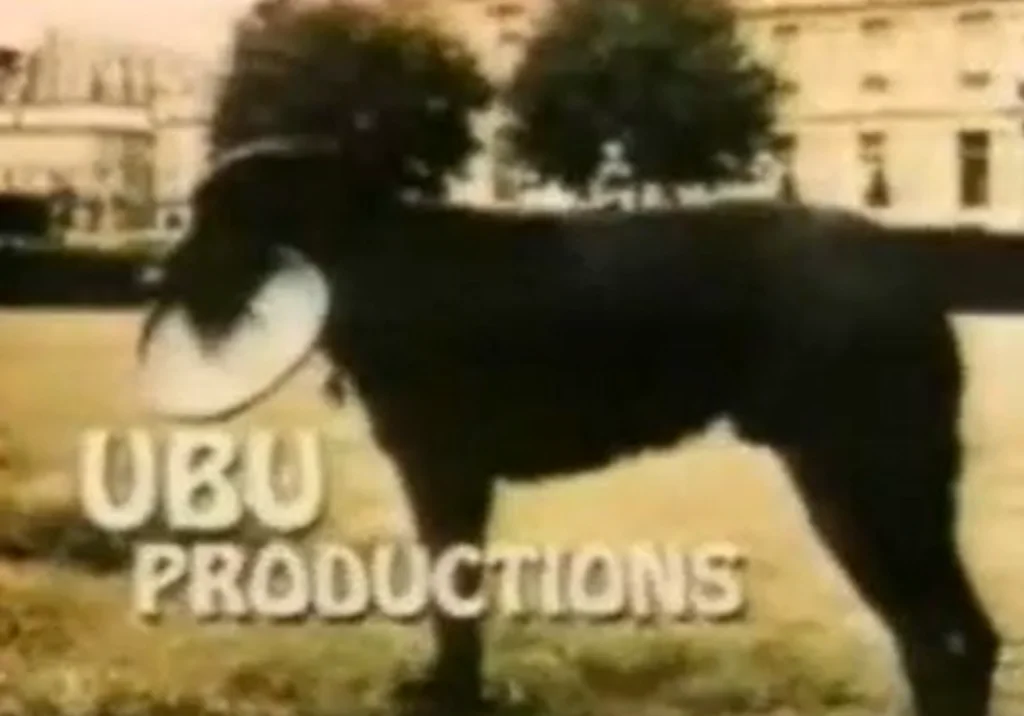
The endearing production company tag featuring a black dog would signal the end of favorite shows, causing a wave of announcement about what to watch next. Children would bark along with the familiar closing credit, having no idea who Ubu actually was but feeling connected to this unseen canine star. The brief clip became so familiar that families could recite it in perfect unison, creating one of those strange shared experiences that defined ’80s television viewing.
Parents would use the phrase when training actual family pets, finding it far more effective than standard commands thanks to its television familiarity. The black Lab became an unofficial mascot in households that had never actually seen him beyond those few seconds at a show’s conclusion. This tiny snippet of audio—lasting mere seconds—somehow became permanently embedded in the collective consciousness of an entire generation of viewers.
13. “Sorry, wrong number!”
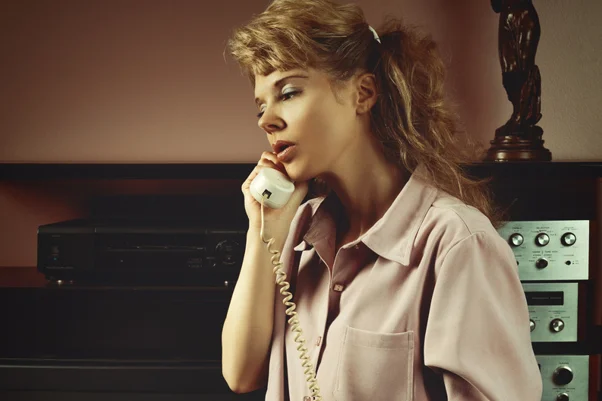
The apologetic phrase would ring out whenever someone answered a call meant for another household, a common occurrence in the pre-caller ID era. Family conversations would be interrupted by the jangling telephone, leading to polite exchanges with strangers who had misdialed by one digit. These brief, awkward interactions with unknown callers were simply part of having a telephone, creating momentary connections between households that would never otherwise interact.
The shared telephone meant everyone’s conversations happened in the living room’s center, with family members pretending not to eavesdrop while obviously hanging on every word. Teenagers would stretch the coiled cord to its absolute limit, seeking whatever privacy could be achieved while still technically remaining in a common area. The phrase “wrong number” represented those strange, fleeting connections with unseen others—brief reminders that your family’s living room was connected to countless others through simple copper wires.
Those sounds and phrases that once filled our living rooms have largely faded now, replaced by the quiet tapping of individual screens and personalized entertainment experiences. The shared soundtrack of our ’80s weekends—from catchphrases to commercial jingles—created a common language that united families and neighborhoods in ways we didn’t appreciate at the time. While technology has given us more choices and convenience, many of us still feel a twinge of nostalgia for those Saturday sounds that meant we were all experiencing the same cultural moments, together in real-time, in the beating heart of the family home.


